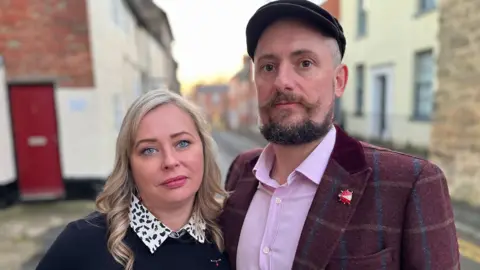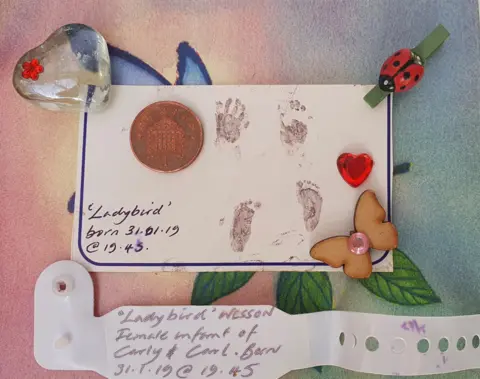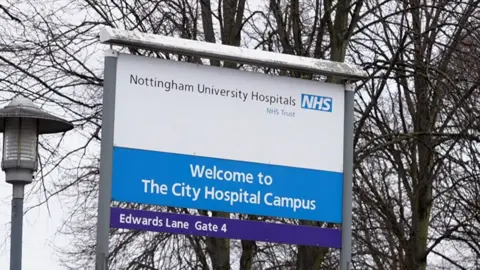We aborted healthy babies after NHS mistakes, couples tell BBC
 BBC
BBCTwo couples have told the BBC they went through with abortions after an NHS trust mistakenly told them their unborn babies had serious genetic conditions.
They say errors by doctors at the Nottingham University Hospitals NHS Trust led to them terminating their pregnancies.
Another family say a last-minute scan on the day they were due to have an abortion changed their minds and they are now the parents of a healthy nine-year-old boy.
The trust, which is currently at the centre of the largest maternity inquiry in the history of the NHS, said its foetal medicine teams strived to provide "compassionate and professional" care.
'The most impossible choice'
"Our daughter should be here," says Carly Wesson, who terminated her pregnancy at 14 weeks.
Ms Wesson and her partner Carl Everson were expecting their first child in January 2019, when a 12-week scan indicated their baby had a high chance of having Down's Syndrome.
They were offered a test, known as chorionic villus sampling (CVS), to check if their baby had any genetic or chromosomal conditions.
Two days later, the foetal care team at City Hospital in Nottingham told them the initial results indicated their daughter had a rare genetic condition called Patau's Syndrome, which often results in miscarriage, stillbirth, or the baby dying shortly after birth.
Ms Wesson, 43, says she had a conversation shortly afterwards with a foetal care consultant.
She says she was told her baby would be left with severe care needs, and that it may not survive the pregnancy.
"It's the most impossible choice we've ever had to make. We thought the best option was to end the pregnancy because the baby was suffering."
Results from a more detailed analysis of the sample were due back two weeks later. The couple asked if it might show a different outcome, but they say their consultant advised them it would not.
The couple decided to have an abortion.

"It's just an awful, impossible situation," says Ms Wesson. "There was no good outcome, we had no hope."
Six weeks after the abortion, they were asked to attend a meeting at City Hospital, which they assumed was a routine follow-up.
"[The consultant] just walked in and the first thing she said was 'I have got something to tell you, your results have changed'," says Ms Wesson.
The second test, called a long term CVS culture, showed their daughter, who the couple had nicknamed Ladybird, had no chromosomal abnormality.
When they asked if their daughter would have survived, Ms Wesson says the doctor told the couple: "Well, you could have miscarried anyway."
"That's always stuck with me - it was almost malicious," she says.
An investigation into the death carried out by the trust said the second test showed "all 50 cells studied had a normal chromosome compliment".
The first test result - which the couple say was the basis on which they decided to terminate the pregnancy - had been a false positive.
This is "a well-recognised hazard of early CVS results", the investigation found.
The trust, it concluded, "must take responsibility for an outcome which would not have occurred were it not for a series of deficiencies in care, knowledge and process, all lining up together".
"Although not absolutely certain, it seems highly probable that the pregnancy was, in fact, chromosomally normal," it said.
Anthony May, chief executive at Nottingham University Hospitals NHS Trust, said: "I know that we failed Carly, Carl and their baby, Ladybird, in 2019, and for that I am truly sorry. While words will never change the outcome, I can assure them and other families that we have investigated and learnt from this tragic case.
"Since 2019, we have implemented the findings from this incident, ensuring we have robust processes for checking, communicating and monitoring results."
Wrong diagnosis
Another family, who wish to remain anonymous, have told the BBC they ended their pregnancy in 2017 after they too were incorrectly told their baby had a genetic condition.
Following a routine scan at 20 weeks, they say they were told there may be some abnormal development and were referred to a foetal care consultant at City Hospital.
A few days later, they were informed their baby likely had a life-limiting illness. As the condition was inherited, the parents were genetically tested to see if they were carriers, which the trust completed and promised expedited results.
The BBC is not identifying the condition to protect the family's privacy, at their request.
Several weeks later, with the results still not in, the family say the hospital called to tell them they had less than 24 hours to decide whether to terminate the pregnancy as it would be more complicated to carry out later.
By this point, the pregnancy was just one day under 24 weeks, the legal limit for an abortion in most circumstances.
Given the clear advice from doctors - that the baby might not survive or die shortly after birth, or have a life-limiting condition - the couple decided to end the pregnancy.

When a post-mortem was carried out, the baby was found not to have the condition. The trust, they say, has never provided them with an explanation for the wrong diagnosis.
"I kept calling the hospital every day asking for those test results, I had my very much-wanted baby kicking inside me," the mother told the BBC.
"I needed to know whether to disconnect from the pregnancy, as I didn't know if my baby would survive. They never explained we had this time pressure. Then I got a frantic call in the late afternoon one day telling me we had to decide by the following day to terminate or it would be too late. It was horrific."
She says she had the termination on the labour ward, surrounded by other mums giving birth to healthy babies.
An investigation into the maternity care provided by the Nottingham University Hospitals NHS Trust is currently under way.
The treatment that more than 2,000 families received at the trust's two hospitals - the Queen's Medical Centre and City Hospital - is being examined by senior midwife Donna Ockenden, who led the review into the maternity care scandal in Shrewsbury and Telford.
The inquiry includes a review of the antenatal care provided by the trust. A separate police investigation is also under way.
A third family have told the BBC they almost had a termination after they were told by the trust's foetal care team that their unborn baby likely had a life-limiting genetic condition.
They wish to remain anonymous as they have not told their son, who was born with no health issues, how close they came to ending the pregnancy.
The couple had already experienced a stillbirth when they became pregnant with their son in 2015.
An eight-week scan showed up what looked like "a black hole in the middle," according to the father.
"We were told that our baby wasn't emptying his bladder, that's what the big shape was," recalls his mother. "If he couldn't empty his bladder, he would either go on to be stillborn or live a very short life."
'It's going to die'
A second scan was ordered, which the parents said showed an even bigger black shape.
The baby, they say they were told, may develop genetic conditions which would be incompatible with life. They say they were offered a termination for medical reasons.
"I really remember us then telling friends, not with a happy, joyful, 'guess what, we're pregnant'. It was more of a 'we're having another baby and it's going to die'. [We did] things like planning that he would be buried in the place that we now visit with him [where his brother is buried]," says his mother.
After much discussion, the couple say they felt "like there was only one choice to make".
They headed to the Queen's Medical Centre to take the medication that would end the pregnancy.
The father, however, requested one final scan "and absolutely crazily, while being scanned, our little baby emptied his bladder. So we didn't end the pregnancy."
The parents say the trust has never given them an explanation about what happened.
Nottingham University Hospitals NHS Trust told the BBC they couldn't provide specific answers, as two of the families were speaking anonymously.
"Our foetal medicine teams provide a specialist regional service to hundreds of women and families a year from across the East Midlands," said the chief executive Anthony May.
"For women and families using this service, there will be times when they are faced with making very difficult and long-lasting decisions. We strive to support them to do that in the most compassionate and professional manner and we always want to hear from families who don't feel their experience matches that ambition."
Donna Ockenden's review of maternity care at Nottingham University Hospitals NHS Trust is expected to hear from about 2,500 families in total, with the publication of a report now expected in June 2026.
If you have been affected by any of the issues raised in this story you can visit BBC Action Line
